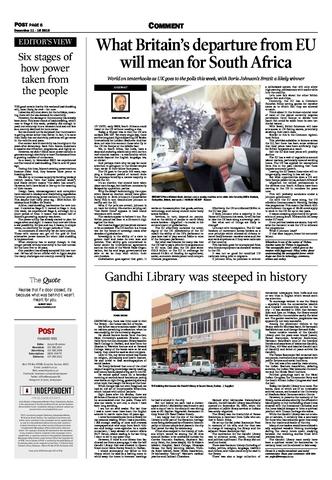
Up until early 2009, South Africans could travel to the United Kingdom without needing a visa.
Today, a 10 year visa to visit the UK sets us back R20 437. Yet every single day, there are 5 long haul flights departing OR Tambo International for London Heathrow. And that does not take into account those who fly to the UK via Europe or the Middle East.
We in South Africa, like India, have a deep and enduring relationship with our former colonial masters – a relationship which extends beyond the English language, tea, or cricket.
And perhaps that’s why we pay far more attention to goings-on in the former empire than we do to their fellow Eurpoeans.
The United Kingdom goes to the polls this week capping a three year period of turmoil since the populace voted by a narrow majority to leave the European Union.
It’s an election that should have taken place months ago, but had been consistently delayed by opposition parties.
Why the delay? Astonishingly, the opposition feared an election would have given a majority to Boris Johnson’s Conservative Party. This in turn would allow Johnson to swiftly exit the EU.
Now, if the polls are correct, Johnson is on track for victory. His election rallying call “Get Brexit Done” appears to have found resonance with voters.
The markets appear to believe it too. The British Pound has risen to a 31 month high against the Euro.
But there’s a bigger philosophical element to be considered. The UK election is a litmus test for the future of sovereign states after decades of globalisation.
Sovereignty is the ability of a state to govern itself and make its own laws and policies. That ability gets constrained to some extent by international agreements such as the rules of the World Trade Organisation, but by and large, governments are able to do as they wish within their own borders.
Globalization goes against that grain. It works on the assumption that goods, services, technology, and money should move freely across borders.
Services, in turn, depend on people. And so the ability of people to move freely across borders — migration — is crucial to the entrenchment of globalization.
The European Union effectively curtailed the sovereignty of the United Kingdom. Membership of the EU meant the ability of UK’s parliament to pass laws had to play second fiddle to rules of the European Parliament.
But what was irksome for many was that the UK had to pay a price for its acquiescence to EU rules. Last year, the UK paid about £13.2 billion to the EU in exchange for around £4.3 billion of funding for agricultural, social, economic development and competitiveness programmes.
Effectively, the UK contributed £8.9 billion to the EU last year.
If Boris Johnson wins a majority in the House of Commons this week, he will be free to take the UK back along a sovereign path.
But what sort of things are likely to change?
Let’s start with immigration. The EU had freedom of movement across borders as a core principle which allowed all citizens to move freely between member states and live and work anywhere as if they were nationals of that country.
This has been great for unemployed Poles who found employment as domestic workers in the UK. It was not so good for unskilled UK nationals losing jobs to migrants.
If Johnson wins, he promises to enforce a skills-based system that will only allow high-earning professionals with scarce skills into the country.
Let’s now talk about the other British staple: fish and chips. Currently, the EU has a Common Fisheries Policy setting quotas for member states as to which fish they are allowed to catch.
Think about it: the former colonial ruler of most of the planet currently requires permission from Europe to decide how much fish could be taken from its own territorial waters…
With Brexit, British fishermen will have sole access to UK fishing waters; potentially doubling their catch sizes.
Similar to this is the Common Agricultural Policy. This provides subsidies to farmers across the EU, but there has been some evidence that food prices have been artificially high for British taxpayers as a result. Exit the EU and food prices will possibly decline.
The EU has a web of regulations around labour matters; particularly around working hours. The UK has applied for exemptions from this is in the past, claiming that these impede economic growth. Leaving the EU means these rules will no longer apply, resulting in less red tape.
But what opportunities does a UK exit from Europe present for us, as South Africans?
Migration for skilled professionals is the obvious one. South Africans have been moving to the UK in numbers for years now. This will probably accelerate under a Johnson government.
Up until the EU came along, the UK offered a Commonwealth Working Holiday visa programme. This meant that South Africans between the ages of 18-30 could apply to work in the UK for up to two years.
It was an amazing opportunity for generations of young South Africans but fell away under EU rules. If our political leaders are astute, they will seize the moment to ask the UK to reinstate the programme.
What if Johnson loses?
If that does happen, brace for economic fallout.
- « First
- ← "Finding ways to relate to each other more graciously"
- → "The HPCSA needs a strong dose of something"
- Last »
